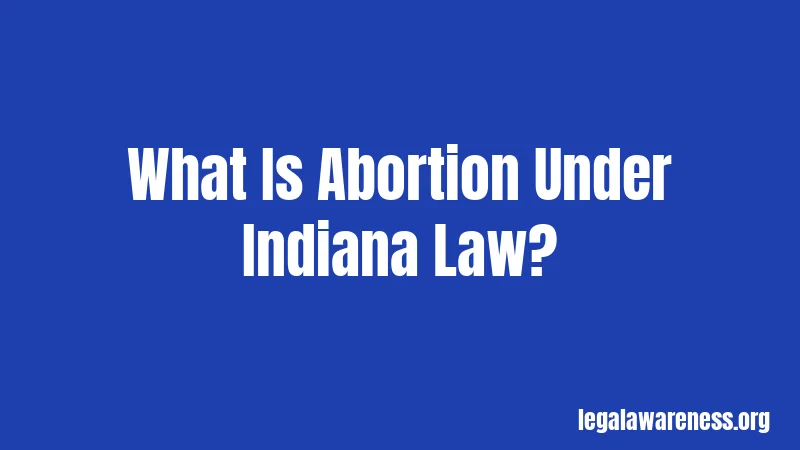Abortion Laws in Indiana (2026): What Really Changed After the Ban
Most people don’t know that Indiana was the first state to pass a near-total abortion ban after the Supreme Court overturned Roe v. Wade. Seriously. The state moved fast in summer 2022, and the law took full effect in August 2023.
Now, abortion is almost completely illegal in Indiana. The penalties for doctors are serious. And if you’re trying to understand what’s allowed and what isn’t, it can feel confusing. Let’s break down exactly what you need to know.
What Is Abortion Under Indiana Law?

First, let’s get clear on the legal definition. Indiana law defines abortion as ending a pregnancy with an intention other than producing a live birth or removing a fetus that has already died. This includes both surgical procedures and abortion-inducing medications.
Here’s the key point: under Indiana law, abortion is automatically considered a criminal act unless it falls under one of the narrow exceptions. That’s different from how most people think about it. The law assumes it’s illegal first, then carves out specific situations where it’s allowed.
The Near-Total Ban: What’s Illegal Now
Hold on, this part is important.
Indiana’s abortion ban went into effect on August 21, 2023. Before that, abortion was legal up to 20 weeks. Now? It’s banned almost entirely. The state saw a 98% drop in abortions between 2022 and 2024. Only 146 abortions happened in the state in all of 2024.
So what exactly is banned? Pretty much everything. You cannot get an abortion in Indiana just because you want one. You cannot get one because you’re not ready to be a parent. Financial hardship? That’s not an exception either.
The ban applies at all stages of pregnancy. There’s no cutoff like “legal until 12 weeks” or “legal until viability.” It’s banned from the moment of a confirmed pregnancy unless you qualify for an exception.
The Three Main Exceptions

Wondering if any of this applies to you? Here are the only situations where abortion is legal in Indiana.
Life or Serious Health Risk to the Mother
You can get an abortion if continuing the pregnancy would put your life at serious risk. You can also qualify if there’s a risk of substantial and permanent harm to your physical health. But here’s the tricky part: the law doesn’t spell out exactly what conditions count.
Doctors have to use their “reasonable medical judgment” to decide. Many physicians are nervous about this. They worry about making the wrong call and facing criminal charges. This has created real problems for patients with complications like severe preeclampsia, certain heart conditions, or cancer that requires treatment incompatible with pregnancy.
The law specifically says mental or emotional conditions don’t count. Threats of self-harm also don’t qualify as a medical emergency. This is one of the strictest interpretations in the country.
Lethal Fetal Anomalies
If a fetus is diagnosed with a condition that would cause death before birth, during birth, or within three months after birth, abortion is allowed. This exception is available up to 20 weeks post-fertilization, which equals about 22 weeks from your last period.
Examples might include conditions like anencephaly, where the brain doesn’t develop properly. But the diagnosis has to show the condition is truly lethal. Non-fatal disabilities, including Down syndrome, don’t qualify for this exception.
Rape or Incest
Victims of rape or incest can access abortion, but only up to 10 weeks post-fertilization. That’s roughly 12 weeks from your last period. After that deadline passes, this exception no longer applies.
You don’t currently need a police report or other documentation to use this exception. A written certification from your doctor is required. However, there have been legislative attempts to require signed affidavits, so this could change.
Where Must Abortions Happen?
This surprises a lot of people. Even when you qualify for an exception, you can’t just go to any clinic.
All abortions in Indiana must happen at licensed hospitals or surgical centers owned by hospitals. The abortion clinics that operated before the ban? They lost their licenses. Most have closed or stopped offering abortion services entirely.
Only two physicians in the entire state still regularly perform abortions. Makes sense, right? Not many doctors want to risk their careers and freedom in this legal environment.
Penalties for Doctors

Let’s talk about the penalties. They’re no joke.
A doctor who performs an illegal abortion commits a Level 5 felony. That’s the same category as involuntary manslaughter in Indiana. The prison sentence ranges from one to six years. Fines can reach up to $10,000.
But it gets worse. Doctors also face mandatory license revocation if the Attorney General proves they performed an abortion intending to violate the law. This means they can never practice medicine in Indiana again.
Even doctors who do everything right still worry. Anti-abortion groups have filed hundreds of complaints against physicians. These complaints can trigger investigations, subpoenas for medical records, and disciplinary actions. One Indianapolis OB-GYN was reprimanded and fined for a case that made national news, even though she followed the law.
Honestly, this is the part most people miss. The legal risk has created a chilling effect. Doctors hesitate to provide care even when they believe it’s medically necessary. Patients suffer while physicians consult with lawyers and hospital legal teams.
What About Patients?
Here’s some relatively good news. Indiana’s abortion ban targets providers, not patients.
If you seek an abortion, you face no criminal penalties under this law. You cannot be prosecuted for obtaining an abortion, whether in Indiana or elsewhere. This is different from some proposals in other states.
However, your medical records could potentially be accessed by law enforcement in certain situations. Privacy protections were weakened when a federal judge struck down enhanced HIPAA protections in June 2025.
Other Requirements That Still Apply
Even for the exceptions, there are extra hoops to jump through.
Mandatory Ultrasound and Waiting Period
You must have an ultrasound. Then you have to wait at least 18 hours before the procedure. This means two separate trips to the hospital in most cases.
The provider must offer you the chance to see the ultrasound image and hear the heartbeat. You can decline, but the offer has to be made.
Counseling Requirements
Before the ultrasound, you’ll receive state-mandated counseling. This includes specific information chosen by the state. Providers call it “biased counseling” because it emphasizes continuing the pregnancy.
You’ll be told that human physical life begins at fertilization. You’ll receive information about fetal development. These requirements apply even for rape and incest cases.
Parental Consent for Minors
If you’re under 18, you need notarized written consent from a parent, legal guardian, or custodian. They must show government-issued ID and accompany you to the appointment.
There’s one exception: if you’re pregnant because of rape or incest by that parent or guardian, their consent isn’t required. Pretty straightforward reasoning there.
You can also petition the juvenile court for a waiver if you object to the consent requirement or if your parent refuses. A judge can approve the abortion if it’s in your best interest.
The Religious Freedom Exception
Now, here’s where things get interesting.
A lawsuit filed by Hoosier Jews for Choice and several individuals challenged the ban on religious grounds. Their argument? Indiana’s Religious Freedom Restoration Act protects religious exercise. Some faiths, including certain Jewish traditions, believe life begins at birth, not conception. Forcing followers to continue pregnancies violates their religious freedom.
In April 2024, the Indiana Court of Appeals ruled that the abortion ban likely violates RFRA. The case has continued through the courts since then. In December 2024, the Indiana Supreme Court allowed the preliminary injunction to stand and sent the case back to trial court.
What does this mean for you? If you have sincere religious beliefs that require access to abortion, you may be protected. The ACLU of Indiana encourages people in this situation to contact them. This is still developing, so consultation with counsel is important.
Traveling Out of State
Can you leave Indiana to get an abortion? Absolutely yes.
Indiana’s law doesn’t prevent you from traveling to another state. Illinois is the most common destination. Since the ban took effect, there’s been a five-fold increase in Indiana patients going to Illinois.
In 2024, about 9,500 Indiana residents traveled to nearby states for abortions. Illinois provided 23% of all out-of-state abortions nationally that year. Michigan and Ohio are also options, depending on where you live.
From Indianapolis, you’re looking at about a two-hour drive to Champaign, Illinois. The Chicago area is further but has more providers. Planned Parenthood and other organizations can help with travel logistics and funding.
Getting Help and Resources
Don’t worry, there are people who can help you navigate this.
All-Options
This organization runs Indiana’s only abortion fund. They help cover procedure costs and can assist with logistics. Their resource center is in Bloomington.
Planned Parenthood
While Planned Parenthood can’t perform abortions in Indiana anymore, their centers still offer other reproductive health services. They can provide referrals and help you find care in other states.
Chicago Abortion Fund
This fund specifically helps Midwesterners access care. They provide financial support, travel assistance, and logistical help.
ACLU of Indiana
If you believe your rights are being violated, especially for religious freedom claims, the ACLU can review your situation.
What Could Change
The legal landscape keeps shifting. Here’s what to watch.
The religious freedom case is still being litigated. A trial could expand access for people with religious objections. The Indiana legislature could also try to close this loophole by amending RFRA or the abortion law.
There have been proposals to require documentation for rape and incest exceptions. If passed, you might need a signed affidavit or other proof before qualifying.
Federal policy matters too. Changes to HIPAA, medication abortion rules, or funding for travel assistance could all affect access.
Frequently Asked Questions
Is abortion completely illegal in Indiana? Almost. Abortion is banned except for life-threatening health conditions, lethal fetal anomalies up to 22 weeks, and rape or incest up to 12 weeks.
Can I be arrested for getting an abortion? No. Indiana’s law penalizes providers, not patients. You cannot face criminal charges for seeking or obtaining an abortion.
Do I need proof of rape to qualify for that exception? Currently no. A written certification from your physician is required, but you don’t need a police report or other documentation.
Can I travel to Illinois for an abortion? Yes. No law prevents Indiana residents from obtaining abortions in other states. Many people travel to Illinois, Michigan, or Ohio.
What are the penalties for doctors who perform illegal abortions? Doctors face a Level 5 felony charge, which carries one to six years in prison and fines up to $10,000. Their medical license would also be revoked.
Does the religious freedom exception apply to everyone? The exception applies to people whose sincere religious beliefs direct them to obtain an abortion. Contact the ACLU of Indiana if you think this applies to you.
Is there a waiting period? Yes. You must wait at least 18 hours after a mandatory ultrasound before having the procedure.
Final Thoughts
Indiana’s abortion laws are among the most restrictive in the country. If you’re facing an unplanned pregnancy or a complicated medical situation, knowing your options matters.
The exceptions exist but are narrow. The process has extra steps. And if you don’t qualify, traveling out of state is the reality for thousands of Hoosiers each year.
Stay informed. Understand your rights. And if you’re unsure about anything, talk to a healthcare provider or a legal expert who knows this area. When in doubt, organizations like the ACLU and All-Options can point you in the right direction.
References
- Indiana Code § 16-34-2-1 (2024 Indiana Code on abortion requirements and penalties): https://law.justia.com/codes/indiana/title-16/article-34/chapter-2/section-16-34-2-1/
- Center for Reproductive Rights, Indiana abortion laws overview: https://reproductiverights.org/maps/abortion-laws-by-state/indiana/
- Guttmacher Institute, Interactive Map of U.S. Abortion Policies: https://states.guttmacher.org/policies/indiana/abortion-policies
- ACLU of Indiana, Abortion Access Information: https://www.aclu-in.org/abortion-access-indiana/
- Indiana Capital Chronicle, Religious freedom lawsuit update (December 2025): https://indianacapitalchronicle.com/2025/12/03/three-years-after-injunction-religious-freedom-lawsuit-against-indiana-abortion-ban-nears-decision/
